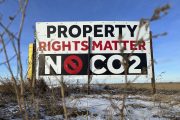
The U.S. Environmental Protection Agency (EPA) will propose repealing the Clean Power Plan — the set of regulations put into place by the Obama administration to severely limit the amount of carbon dioxide emissions that power plants can release into the atmosphere. Former President Obama justified these regulations in the name of fighting “climate change.” In a video released by the White House on social media on August 1, 2015, Obama called the plan “the biggest most important step we’ve ever taken to combat climate change.”
On October 4, both the New York Times and Reuters reported that they had reviewed an internal EPA document, “October 2017 Tiering List,” which states that the agency will issue a proposal to repeal the Obama plan and will ask the public to recommend ways in which it could be replaced.
“The agency is issuing a proposal to repeal the rule,” the EPA document states. It says the agency will issue a formal notice of its intention to develop a new rule “similarly intended to reduce carbon dioxide emissions from existing fossil-fueled electric utility generating units and to solicit information for the agency to consider in developing such a rule.”
EPA spokeswoman Liz Bowman declined to comment to the Times on the document or plans for the policy. The document did not provide any details for the possible new rule, the Times and Reuters reported.
President Trump signed the Executive Order on Energy Independence on March 28, which called for a review of the Clean Power Plan. In order to comply with the president’s action, EPA Administrator Scott Pruitt issued a number of Federal Register notices. One such notice, headed “Review of the Clean Power Plan,” noted, in part:
On March 28, 2017, President Trump issued an Executive Order establishing a national policy in favor of energy independence, economic growth, and the rule of law. The purpose of that Executive Order is to facilitate the development of U.S. energy resources — including oil and gas — and to reduce unnecessary regulatory burdens associated with the development of those resources. The President has directed agencies to review existing regulations that potentially burden the development of domestic energy resources, and appropriately suspend, revise, or rescind regulations that unduly burden the development of U.S. energy resources beyond what is necessary to protect the public interest or otherwise comply with the law.
Pruitt also sent a letter to Kentucky Governor Matt Bevin on March 30, which was made available to all of the nation’s governors, informing them that on February 9, 2016, the Supreme Court stayed implementation of the Clean Power Plan (CPP). Because of that stay, noted Pruitt, “States and other interested parties have neither been required nor expected to work towards meeting the compliance dates set in the CPP. It is the policy of the Environmental Protection Agency (EPA) that States have no obligation to spend resources to comply with a Rule that has been stayed by the Supreme Court of the United States.”
Reuters reported that the EPA now intends to issue what it calls an Advanced Notice of Proposed Rulemaking to solicit input as it considers “developing a rule similarly intended to reduce CO2 emissions from existing fossil fuel electric utility generating units.”
It can be surmised from that statement the EPA will still seek to reduce CO2 emissions from power plants, but with less stringent requirements than those sought by the Obama administration.
Reuters also noted that on September 28, the conservative Texas Public Policy Foundation met with EPA and White House officials to suggest that the administration also review the science underpinning the CPP and other U.S. greenhouse gas regulations, citing a document posted on the White House Office of Management and Budget website.
While the Reuters report claimed that the Obama administration’s greenhouse gas regulations were based on the “broad scientific consensus that carbon dioxide and other emissions from burning fossil fuels are driving global climate change,” so many scientists have disputed that climate-change theory that there is hardly a “consensus.” Besides scientific correctness is not determined by “consensus.” Science is not a popularity contest; it’s about providing facts, figures, tests, and data to back up suppositions.
In our August 4, 2015 article about former President Obama’s unveiling of the “Clean Power Plan,” during which he asserted that the plan was necessary to “to combat climate change,” we observed that even many Republican opponents of the plan failed to address a fundamental question that should form the basis for opposition to such executive branch overreach on environmental policies: “Is there conclusive scientific evidence that manmade activities such as carbon emissions have had any significant effect on the world’s climate?”
In that article, we noted that many reputable scientists think there is no such evidence, and that there is even evidence suggesting that the natural cycle of global warming has reversed itself in recent years and that global temperatures have actually decreased.
While The New American has published numerous articles supporting the arguments of those who challenge the prevailing “global warming” theorists, in our article about Obama’s “Clean Power Plan,” we cited just a few examples. In one we quoted a leading British climate researcher, Lord Christopher Monckton — who was chief policy advisor to the Science and Public Policy Institute and former special advisor to former U.K. Prime Minister Margaret Thatcher from 1982 to 1986. Monckton stated in a June 2015 report that there has been no global warming at all for 18 years and six months. The British climate expert wrote that “the predictions on which the entire climate scare was based were extreme exaggerations” and referred to data collected by a private research company called Remote Sensing Systems (RSS), founded in 1974 by Frank Wentz, who was a member of NASA’s SeaSat Experiment Team.
The New American has also covered several of the Heartland Institute’s climate conferences (See, for example, 2008 Climate Debate: Science Conference Challenges Global Warming Alarmism and Video Interview with Willie Soon, Ph.D. — Heartland Institute Climate Conference 2010).
Among the global-warming “skeptics” who have presented evidence countering the prevailing global-warming theories at these conferences are Greenpeace co-founder Dr. Patrick Moore (now considered a heretic by those who insist that global warming is caused by man); Dr. Alan Carlin, the EPA whistleblower who exposed the EPA’s fraudulent science used to declare CO2 a “pollutant”; Dr. Willie Soon, the astrophysicist whose discoveries debunked the “hockey stick” computer modelers; Dr. Sherwood Idso, one of the world’s leading researchers on CO2; and Dr. S. Fred Singer, atmospheric and space physicist, prolific author, and first director of the National Weather Satellite Service.
As we concluded out article:
Many other scientists’ names could be added to this list. The debate on global warming is obviously far from settled — a point that opponents of the administration’s “Clean Power Plan” would do well to use to their advantage. The EPA should not be able to impose a slew of new regulations based upon unproven, disputed theories.
Since we wrote that article, we have a new administration and a new EPA director. Those who believe that the Clean Power Plan was based on a faulty premise will welcome the current EPA’s proposal to repeal that costly, unnecessary burden on our nation’s power generation industry.
Related articles:
President Obama Unveils “Clean Power Plan” to “Combat Climate Change”
U.K. Scientists: Weak Solar Cycle Could Lower Global Temps by 2050
White House Announces Executive Actions and Private Investments to Beef Up “Clean Energy Innovation”
NOAA’s Own Data Shows That Global Climate Has Cooled Over 10 Years
Climate Expert Lord Monckton: Global Warming Ceased Over 18 Years Ago
Scientists Launch Investigation into Climate Data “Adjustments”
Computer Models vs. Climate Reality
Confab of Climate Experts to Challenge Global Warming “Consensus”
Whatever Happened to Global Warming?
“Not Evil Just Wrong”: Dissecting Environmental Extremism
Climate Change: Global Warming May be Beneficial
Scientists Debunk Climate Models
Environmentalists Lose More Credibility With Global-warming Claims
Documentary Outguns the Opposition in the Global-warming War
Greenpeace Founding Member: Climate Alarmism “Preposterous,” CO2 Emissions Saving Lives
Inhofe Throws Snowball in Senate to Refute Global Warming
N.Y. Times, Greenpeace Smear Warming Skeptic Dr. Willie Soon
Global Conning: Temperature Data Cooked in “Biggest Science Scandal Ever”




